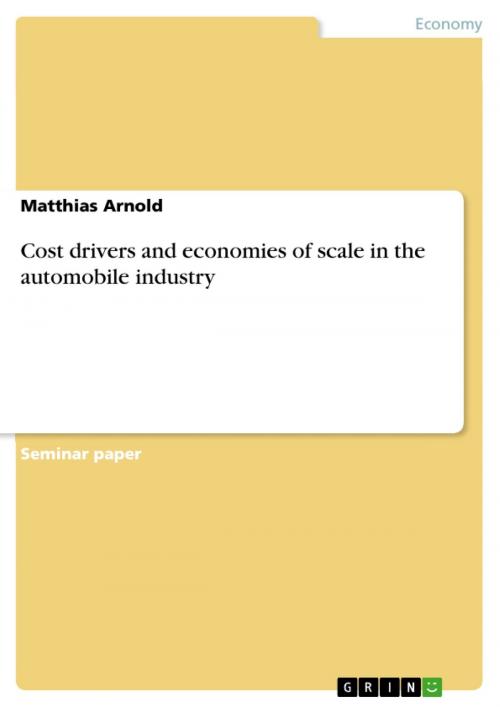Cost drivers and economies of scale in the automobile industry
Business & Finance, Management & Leadership, Industrial Management| Author: | Matthias Arnold | ISBN: | 9783638505901 |
| Publisher: | GRIN Publishing | Publication: | May 29, 2006 |
| Imprint: | GRIN Publishing | Language: | English |
| Author: | Matthias Arnold |
| ISBN: | 9783638505901 |
| Publisher: | GRIN Publishing |
| Publication: | May 29, 2006 |
| Imprint: | GRIN Publishing |
| Language: | English |
Seminar paper from the year 2005 in the subject Economics - Industrial Economics, grade: 60%, University of Bradford (School of Management), course: Business Economics, 15 entries in the bibliography, language: English, abstract: This assignment aims at comparing and contrasting the driver of costs in the automotive industry, both in the short and the long run. Secondly it critically evaluates the benefits from economies of scale in the global automobile industry. The global automobile manufacturing sector accounts to a sales value of $ 1,172 billion in 2004 with a cumulated annual growth rate of 2.7% over the last 4 years. Whereas currently sales in the US are ranked first with stagnating 37%, followed by Europe with also static 30%, rising sales figures in China and India clearly show the growth regions of the next decade (Datamonitor 2005). This slack in well-established markets combined with hard competition from Asia as well as rising costs of production concludes in serious problems for the western giants (Economist 2005). In the first part of this paper, the cost drivers are analysed and implications for the automobile industry are drawn. Normally a mature stage of a sector's life leads to hard and fast competition and an industry consolidation with only the biggest one's surviving. Interestingly, while clearly being in an mature stage of the industry lifecycle, the biggest companies, excluding Toyota, are the most unprofitable in the automobile sector (SEIDELet al2005). The second part of this assignment therefore evaluates the validity of the theory of economies of scale in the automobile sector.
Seminar paper from the year 2005 in the subject Economics - Industrial Economics, grade: 60%, University of Bradford (School of Management), course: Business Economics, 15 entries in the bibliography, language: English, abstract: This assignment aims at comparing and contrasting the driver of costs in the automotive industry, both in the short and the long run. Secondly it critically evaluates the benefits from economies of scale in the global automobile industry. The global automobile manufacturing sector accounts to a sales value of $ 1,172 billion in 2004 with a cumulated annual growth rate of 2.7% over the last 4 years. Whereas currently sales in the US are ranked first with stagnating 37%, followed by Europe with also static 30%, rising sales figures in China and India clearly show the growth regions of the next decade (Datamonitor 2005). This slack in well-established markets combined with hard competition from Asia as well as rising costs of production concludes in serious problems for the western giants (Economist 2005). In the first part of this paper, the cost drivers are analysed and implications for the automobile industry are drawn. Normally a mature stage of a sector's life leads to hard and fast competition and an industry consolidation with only the biggest one's surviving. Interestingly, while clearly being in an mature stage of the industry lifecycle, the biggest companies, excluding Toyota, are the most unprofitable in the automobile sector (SEIDELet al2005). The second part of this assignment therefore evaluates the validity of the theory of economies of scale in the automobile sector.















